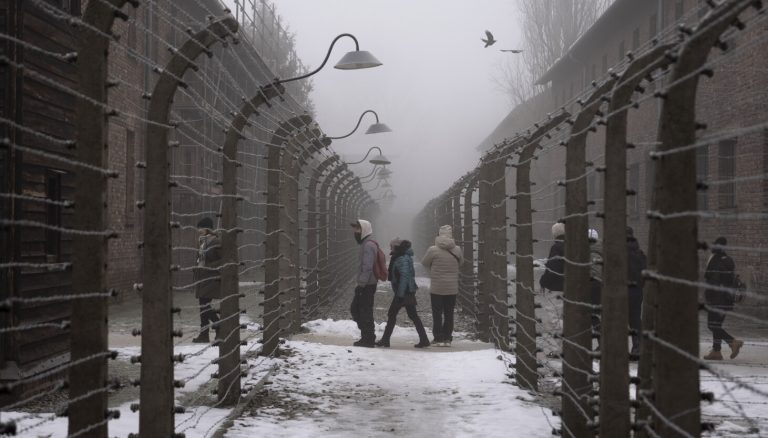Recent surveys claim to show that Americans lack knowledge about the Holocaust. These surveys are not wrong, but they miss the point. It’s not that we don’t know about the Holocaust. That’s because almost everything we know about it comes from entertainment.
Holocaust education in the United States is incredibly poor. There are 21 states that does not require the Holocaust to be taught at allwhile the 29 that do often fail to provide teachers with enough guidance or materials.
In contrast, Holocaust entertainment is booming. Recent films about the Holocaust have won several Academy Awards and Golden Globes. “Holocaust tourism” – visiting memorials and former extermination sites – is now a reality. a billion dollar industry. Holocaust jokes and memes are proliferating on social networks. We are constantly finding new ways to entertain ourselves with the Holocaust.
But the Holocaust is impossible to accurately represent in entertainment. It was a massive genocide that left millions of victims in dozens of countries. They were murdered at thousands of sites across the continent, with guns, gas and slave labor. The authors came from all walks of life and had very diverse backgrounds and motivations.
This means that Holocaust entertainment always oversimplifies its subject. Three dangerous myths arise in the process. The first is that the Jews who died were weak and went to their deaths without protest. The second is that the Nazis were motivated by bloodlust rather than racist ideology. And the third is that the Holocaust had a positive side. It was sad, but it ended in survival, and so it carries messages of hope about the strength of the human spirit.
These myths can be seen in everything from documentaries to blockbusters to bestselling novels about the Holocaust. They distort our knowledge, sometimes in an anti-Semitic way. For example, Jewish suffering in Holocaust entertainment saddens us, but it also makes us wonder why Jews can’t see what’s coming and why they don’t fight back.
Omitting history that cannot be wrapped in “messages of hope”
This encourages a strange mix of pity and disgust. Holocaust entertainment also encourages us to view Nazis as anti-heroes. By portraying them as full of bloodlust, it makes them appear strong and ruthless, which can be impressive. This may explain the numerous recent incidents of children drawing swastika graffiti in schools across the United States In my experience as an educator, such acts are almost never motivated by political beliefs.
Holocaust entertainment doesn’t just distort what we know. It also places limits on what we know.
Events like the Warsaw Ghetto Uprisingin which Jews took up arms and fought the Nazis for weeks in 1943, rarely appear in Holocaust entertainment because they contradict the myth that Jews died without protest.
Questions about what Nazism was, why it arose in Germany after World War I, and why so many people embraced it are rarely addressed. It’s easier and more exciting to show Nazis as impeccably groomed psychopaths who kill for fun.
Holocaust entertainment also tends to omit anything that cannot be wrapped in messages of hope in the story of the Holocaust. These include massacres such as the mass shooting of orphaned babies in Bila Tserkva in Ukraine in August 1941; or sites like Belzec extermination campwhere only two victims out of 500,000 survived and testified after the war.
On top of all this, like the entertainment industry in general, Holocaust entertainment is naturally prone to repeating whatever formula becomes commercially successful. The bestselling novel “The Tattooist of Auschwitz” (2017) gave rise to a series of copied titles, for example “The Saboteur of Auschwitz” (2019), “The Violinist of Auschwitz” (2020) and “The midwife of Auschwitz” (2022), to name just three.
Ultimately, Holocaust entertainment leaves us thinking that the Holocaust happened to people who looked nothing like us, that it was perpetrated by people who looked nothing like us, and that it was produced in a society that looked nothing like ours. This allows us to think that we are engaging in the Holocaust even as we turn away from it.
Today, 80 years after the liberation of Auschwitz, Holocaust entertainment prevents us from facing a terrible truth: ordinary people, just like you and me, accepted an ideology so hateful that crimes of unimaginable proportions took place before their eyes, sometimes with their active participation.
On International Holocaust Remembrance Day, January 27, with a convicted felon and far-right populist ensconced in the White House, seeking to eliminate birthright citizenship, end diversity programs, Refuse all refugees And incite mass deportations of some of the most vulnerable among us – the need to face this truth could hardly be more urgent.
The views and opinions expressed by contributors are their own and do not necessarily reflect those of the Chicago Sun-Times or any of its affiliates.
The Sun-Times welcomes letters to the editor and opinion pieces. See our guidelines.
Get Opinions content delivered to your inbox.


